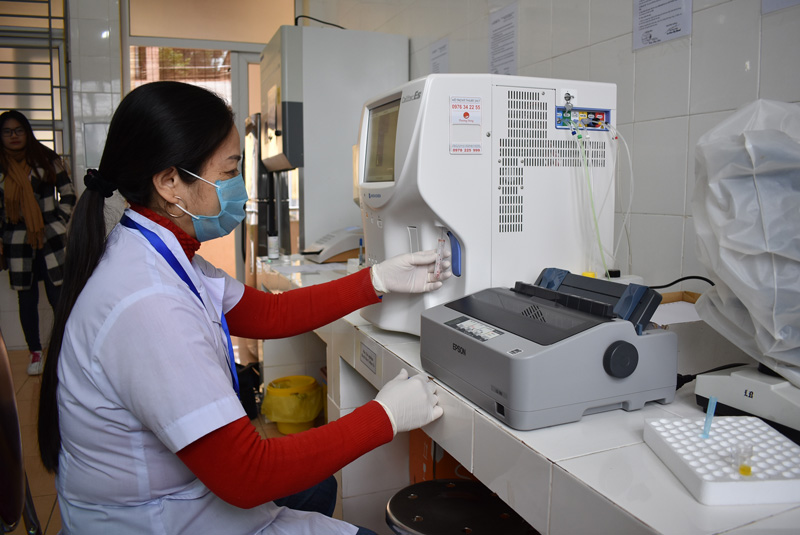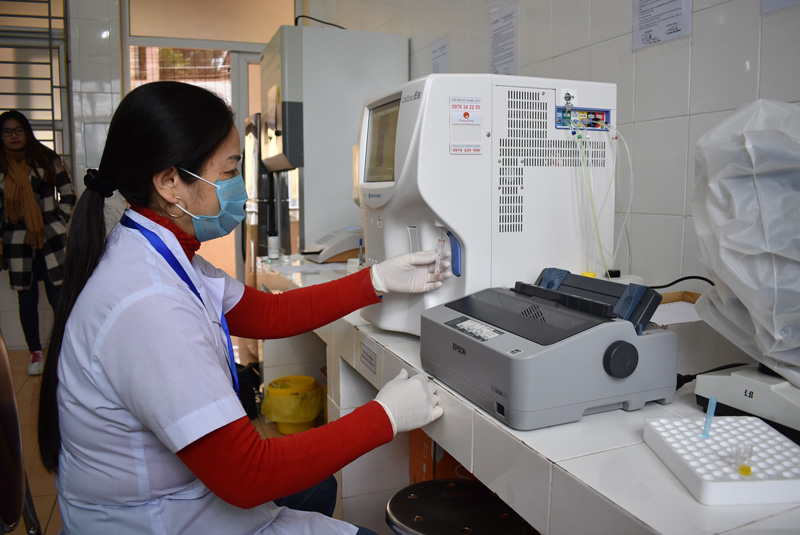
(HBO) - Da Bac is a pure agricultural district, the subjects participating in the compulsory social insurance and health insurance are not many, mainly in the administrative and non-business area, the Party and mass organizations. The employees with the unstable income, the educational level is low, and the awareness is limited, so the development of the voluntary social insurance beneficiaries face many difficulties.
In order to meet the assigned social insurance targets, the
social insurance of Da Bac district has determined that it is necessary to
strengthen the exploitation and expand the subjects participating in social
insurance and health insurance in the past years.
 The Officer of Da Bac Post Office is propagandizing
the voluntary social insurance for business households in Da Bac town.
The Officer of Da Bac Post Office is propagandizing
the voluntary social insurance for business households in Da Bac town.
Right from the beginning of the year, on the basis of tasks
and targets assigned by the provincial social insurance, the leaders of the
district’s social insurance have assigned each officer to proactively urge the
enterprises and the businesses using employers to register for participation of
all employees who are eligible for the compulsory social insurance, continuing
to exploit in new businesses and enterprises, at the same time, developing the
subjects to participate in the voluntary social insurance and the health
insurance for the family members.
The district’s Social Insurance has strengthened the
solutions of collecting and collecting debts in the whole period. The whole the
district has collected the social insurance, the health insurance and the
unemployment insurance of over 83 billion VND, reaching 88.34% of the year
plan; The debts of the social insurance, health insurance and unemployment
insurance are over 1.5 billion dongs. Although the debt is not large, it
affects the legitimate rights of employees, making it difficult for the social
insurance agency to solve the regimes and policies of the social insurance and
health insurance for the local employees.
In 2019, the
provincial social insurance has assigned the targets for the district’s social
insurance to develop 290 people participating in the voluntary social
insurance. The sec
The emulation movement "Hoa Binh joining hands to build new-style rural areas” has been widely spreading, becoming a driving force that motivates the localities to renew rural landscapes and improve the material and spiritual lives of the residents. In this movement, the people play a central role-both as the main implementers and direct beneficiaries of its outcomes.
In response to the global digital revolution, Hoa Binh Newspaper is transforming itself into a modern and multi-platform media hub, blending cutting-edge technology with a restructured newsroom and a new generation of tech-savvy journalists.
Hoa Binh province’s Association of the Elderly recently held a conference to review the project on expanding the inter-generation self-help club model until 2025.
In a move to implement Resolution No. 57-NQ/TW, issued on December 22, 2024 by the Politburo, which targets breakthroughs in science-technology development, innovation, and digital transformation, the Hoa Binh provincial Department of Health has issued a plan to roll out the "Digital Literacy for All” campaign within the local health sector.
An Nghia Commune (Lạc Sơn District) is one of the communes that achieved the tha standard of the national new rural area in 2018. Entering a new development phase, the commune is now trying to meet the criteria for the advanced new rural development. With the strong political will and the public consensus, the commune is gradually overcoming the challenges to reach this goal, aiming for the sustainable development.



 The Officer of Da Bac Post Office is propagandizing
the voluntary social insurance for business households in Da Bac town.
The Officer of Da Bac Post Office is propagandizing
the voluntary social insurance for business households in Da Bac town.